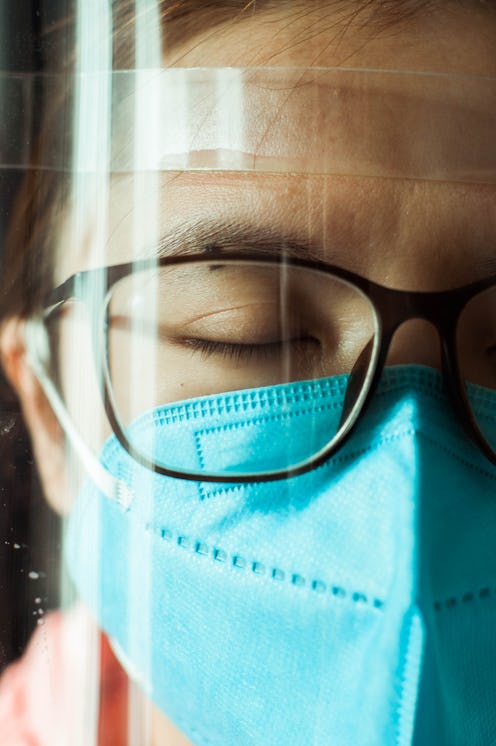Health
Serious Coronavirus Anxiety Now Has A Name
“Coronaphobia” means fear about getting sick is affecting your daily life.

Second-guessing every cough, washing your hands repeatedly, and making sure you always have a spare mask: it's understandable if you're on-edge about health and hygiene in the midst of the COVID pandemic. But some researchers have identified a new tier of anxiety that goes beyond everyday concern about double masking in the supermarket. It's called coronaphobia, and while it's not a recognized anxiety disorder yet, experts say that if fear of COVID is getting in the way of everyday life, it may be the cause.
"A phobia is defined as an irrational or unrealistic fear, not just the normal anxiety that many of us are experiencing," Neda Gould PhD, assistant professor at the Johns Hopkins School Of Medicine Department of Psychiatry and Behavioral Sciences and associate director of Bayview Anxiety Disorders Clinic, tells Bustle. "The intensity of this fear makes it interfere with someone’s functioning and causes significant distress." While anxiety about your health in the midst of COVID is rational, she says, coronaphobia takes it to an extreme.
What Are The Symptoms Of Coronaphobia?
The idea that coronaphobia could be a disorder first surfaced in a study published in the Asian Journal of Psychiatry in December 2020. Researchers identified three components of this kind of anxiety: constant worry, causing symptoms like palpitations, change in appetite, and dizziness; preoccupation with worries and fears; and avoidant behaviors, all directly related to getting or spreading COVID. People with coronaphobia, they wrote, might avoid attending any public gathering, touching any surface, or going into enclosed spaces with other people, even if it's demonstrated to be low risk — such as an outdoor public gathering — or a necessity — such as going to the doctor's office.
They may also start to show repetitive behaviors around cleanliness and hand-washing. One person with coronaphobia was cleaning her face mask three times a day with methanol, according to a study published in European Journal of Neurology in February 2021, and was left severely ill from inhaling the methanol vapors. Coronaphobia, the researchers wrote, "can disturb the overall quality of everyday functioning of the individual."
How Can You Treat Coronophobia?
High anxiety is pretty common right now. "There are data showing that folks are at three to four times the risk for anxiety now compared to before the pandemic," Lily Brown PhD, director of the Penn Center for the Treatment and Study of Anxiety, tells Bustle. "However, when someone stops taking care of their responsibilities or notices impairment in their functioning, these can be indications that the anxiety has received a problematic level that warrants additional attention." That's the point, she says where people might need to explore some professional help.
People with coronaphobia, or any increased anxiety due to the pandemic, can explore cognitive behavioral therapy (CBT), says Brown. "The goal of CBT is to practice getting engaged with your life through a series of small, achievable goals, all with the support and encouragement of a therapist," she says. She cautions that coronaphobia isn't an official diagnosis at the moment, but phobias around cleanliness and germs have a long history, though, so therapists will be experienced at guiding patients through.
Over the long term, it's hard to tell what coronaphobia, and general sky-high levels of anxiety, will do to public health. "After the pandemic, many folks will need to re-learn how to socialize in the workplace and in friendships or romantic relationships," Brown says. "They are likely to also re-calibrate their choices about anti-virus precautions, such as hand-washing and mask wearing." She says it will probably take a long time for people to feel confident in their cleaning and hygiene practices again, and there may be a lot of uncertainty about what counts as "safe" behavior after such a long period of fear.
This anxiety isn't going to automatically dissipate once people get their COVID vaccine, but with some help, you can navigate the world with a bit less fear.
If you or someone you know is seeking help for mental health concerns, visit the National Alliance on Mental Illness (NAMI) website, or call 1-800-950-NAMI(6264). For confidential treatment referrals, visit the Substance Abuse and Mental Health Services Administration (SAMHSA) website, or call the National Helpline at 1-800-662-HELP(4357). In an emergency, contact the National Suicide Prevention Lifeline at 1-800-273-TALK(8255) or call 911.
Experts:
Lily Brown Ph.D.
Nela Gould Ph.D.
Studies cited:
Arora, A., Jha, A. K., Alat, P., & Das, S. S. (2020). Understanding coronaphobia. Asian journal of psychiatry, 54, 102384. https://doi.org/10.1016/j.ajp.2020.102384
Asmundson, G., & Taylor, S. (2020). Coronaphobia revisted: A state-of-the-art on pandemic-related fear, anxiety, and stress. Journal of anxiety disorders, 76, 102326. https://doi.org/10.1016/j.janxdis.2020.102326
Erburu-Iriarte, M., Rodrigo-Armenteros, P., Oyarzun-Irazu, I., Aranzabal-Alustiza, I., Silvarrey-Rodriguez, S., Antón-Méndez, L., & García-Moncó, J. C. (2021). Chronic severe methanol intoxication after repeated mask cleansing for fear to COVID-19 - a new risk of coronaphobia. European journal of neurology, 10.1111/ene.14779. Advance online publication. https://doi.org/10.1111/ene.14779
This article was originally published on